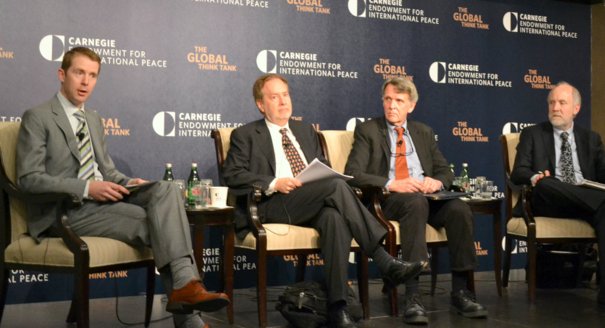Registration
You will receive an email confirming your registration.
South Africa, the only nation ever to build a nuclear arsenal and voluntarily dismantle it, proudly regards itself as a champion of disarmament and nonproliferation. But for almost two decades, the United States and South Africa have struggled over the handling of highly enriched uranium (HEU) stockpiles that have remained after the closure of its bomb program. What is the dispute over South Africa’s stocks of HEU, and how is it playing out? What are its roots? And what are the consequences for global security?
The Center for Public Integrity’s Douglas Birch and R. Jeffrey Smith explained how the two countries have interacted under presidents Obama and Zuma. Harvard University’s Matthew Bunn discussed South Africa’s HEU in the context of efforts to improve nuclear security around the globe. Former ambassador Thomas Wheeler of South Africa joined by phone from Johannesburg to offer his views on the subject. Carnegie's Toby Dalton moderated.
Douglas Birch
Douglas Birch, a journalist with more than three decades of experience, has been senior national security correspondent for the Center for Public Integrity since January 2013. Prior to that, Birch most recently worked for five years at the Associated Press, including as Moscow bureau chief from 2007 to 2010.
R. Jeffrey Smith
R. Jeffrey Smith is the Center for Public Integrity's managing editor for national security. He previously worked in a series of key reporting and editorial roles at the Washington Post, where he wrote about defense, intelligence, and foreign policy matters, including policymaking at the State Department, Pentagon, and White House. In 2006, he won the Pulitzer Prize for Investigative Reporting, along with two colleagues at the Post, for articles on House Majority Leader Tom DeLay and lobbyist Jack Abramoff.
Matthew Bunn
Matthew Bunn is a professor of practice at Harvard University’s John F. Kennedy School of Government. He previously served as an adviser at the White House Office of Science and Technology Policy, where he played a major role in U.S. policies related to the control and disposition of weapons-usable nuclear materials in the United States and the former Soviet Union.
Thomas Wheeler
Thomas Wheeler retired from the South African Institute of International Affairs in 2014. Before that Wheeler served in South Africa’s Foreign Service for forty-two years. His diplomatic career includes postings in Washington, Blantyre, London, Sydney, New York, and Ankara where he served as an ambassador to Turkey and a non-resident ambassador to Azerbaijan, Turkmenistan, Uzbekistan, Kyrgyzstan, and Tajikistan.
Toby Dalton
Toby Dalton is co-director of the Nuclear Policy Program at the Carnegie Endowment for International Peace. An expert on nonproliferation and nuclear energy, his research focuses on cooperative nuclear security initiatives and the management of nuclear challenges in South Asia and East Asia.
